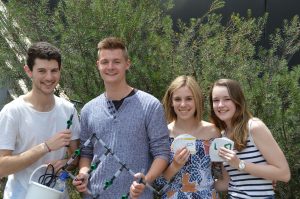Fresh minds develop hands-on learning methods for schools

Global Challenges team with FLEET outreach kits. From left: Joshua Zail, Daniel Schultz, Clarissa Frizziero, Elle Phillips.
FLEET is developing innovative ways to communicate physics to school students.
A collaboration with Monash University Science allowed the Centre to enlist fresh brains to this communications challenge.
A team of maths and physics students from Monash Bachelor of Science–Global Challenges took on the task of developing hands-on games and resources to demonstrate FLEET-relevant science themes in the classroom.
The student team designed a range of innovative games and physical demonstrations, including:
- Electron tiggy, a physical ice-breaker activity to demonstrate electron scattering in conventional semiconductors
- Wired, a card game to introduce electrical circuit components, including transistors
- The Macrochip, a physical, water-based demonstration of binary computing via transistor switches.
ELECTRON TIGGY is a fun, physical demonstration of electron scattering in semiconductors – a key concept in discussing topological transistors that do not allow scattering. Based on British bullrush, Electron tiggy uses stationary players as ‘impurities’ who slow running players (‘electrons’) as they cross the field.
THE ‘WIRED’ CARD GAME introduces students to electrical components and circuit diagrams. Cards display circuit components (matched to the school curriculum) and players ‘build’ a circuit by playing the right cards in order.
THE MACROCHIP builds on a common ‘water analogy’ used in teaching circuits, in which the pressure pushing water through pipes represents voltage, and the amount of water that flows represents current. In the ‘macrochip’ (that is, a ‘macro’-scale microchip) the flow of water shows how transistor switching is used in computing. Vinyl tubing joins tap valves that represent switchable transistors, with four end points representing the binary (0/1, or on/off) digits in a four-digit number. Students open and close taps to build any binary number from 0000 to 11 1 1 .
All exercises involve a hands-on element, which has been shown to be very effective in learning and recall. This helps address a particular challenge of teaching FLEET’s areas of science, which is that atomic-scale phenomena aren’t very physically accessible.
The team developed instructions for manufacture and play that can be used by classroom teachers or by scientists visiting the class. Feedback from teachers has been extremely positive.
The project represented a successful collaboration with FLEET educational liaison Dr Toby Bell at Monash University Science.
More information
- Dr Dianne Ruka FLEET Senior Education & Training Coordinator education@fleet.org.au
- Dr Toby Bell FLEET Educational Liaison, Monash University toby.bell@monash.edu
- Dr Djuke Veldhuis Djuke.Veldhuis@monash.edu
- Monash University Global Challenges Program Monash.edu/global-challenges




